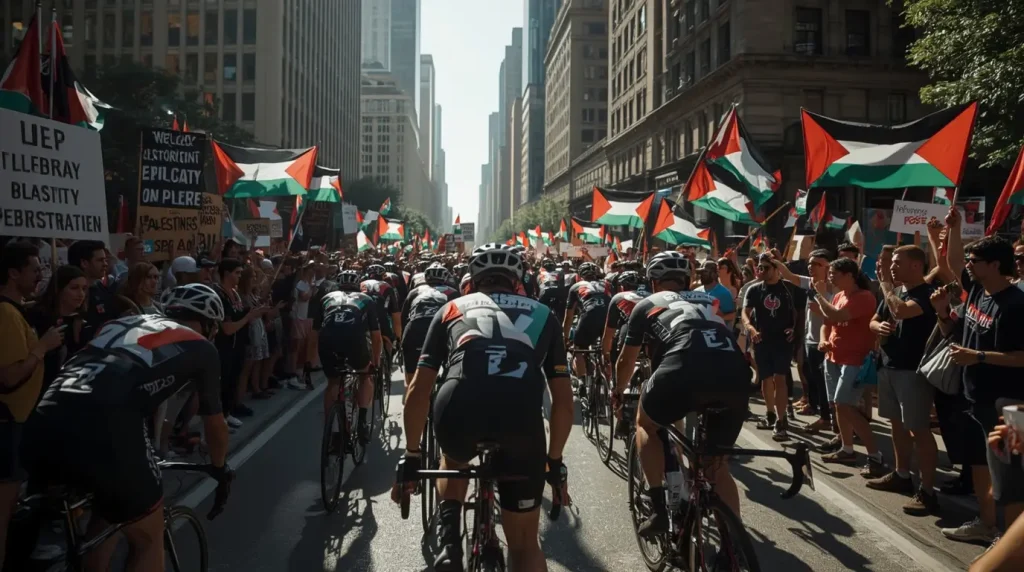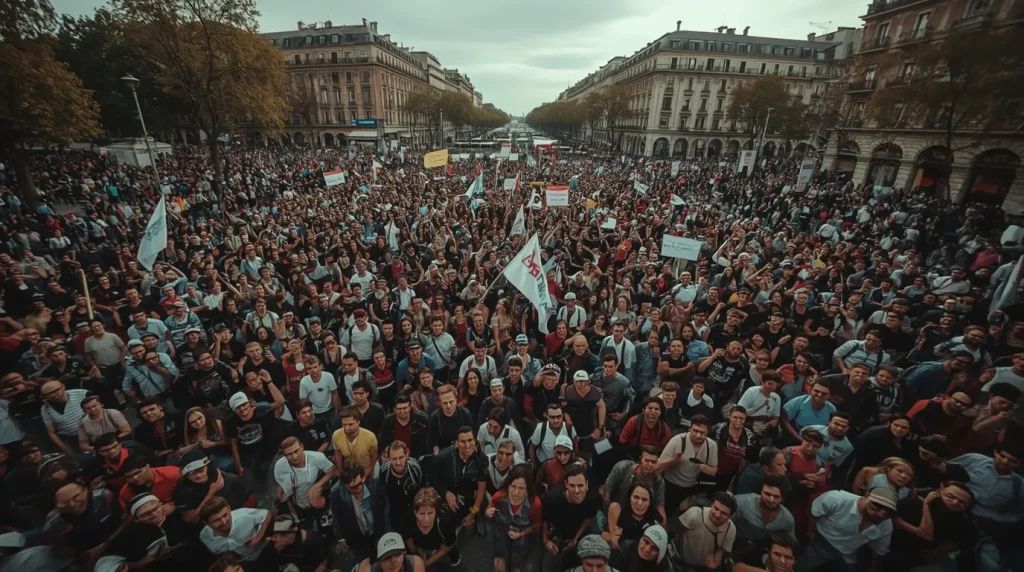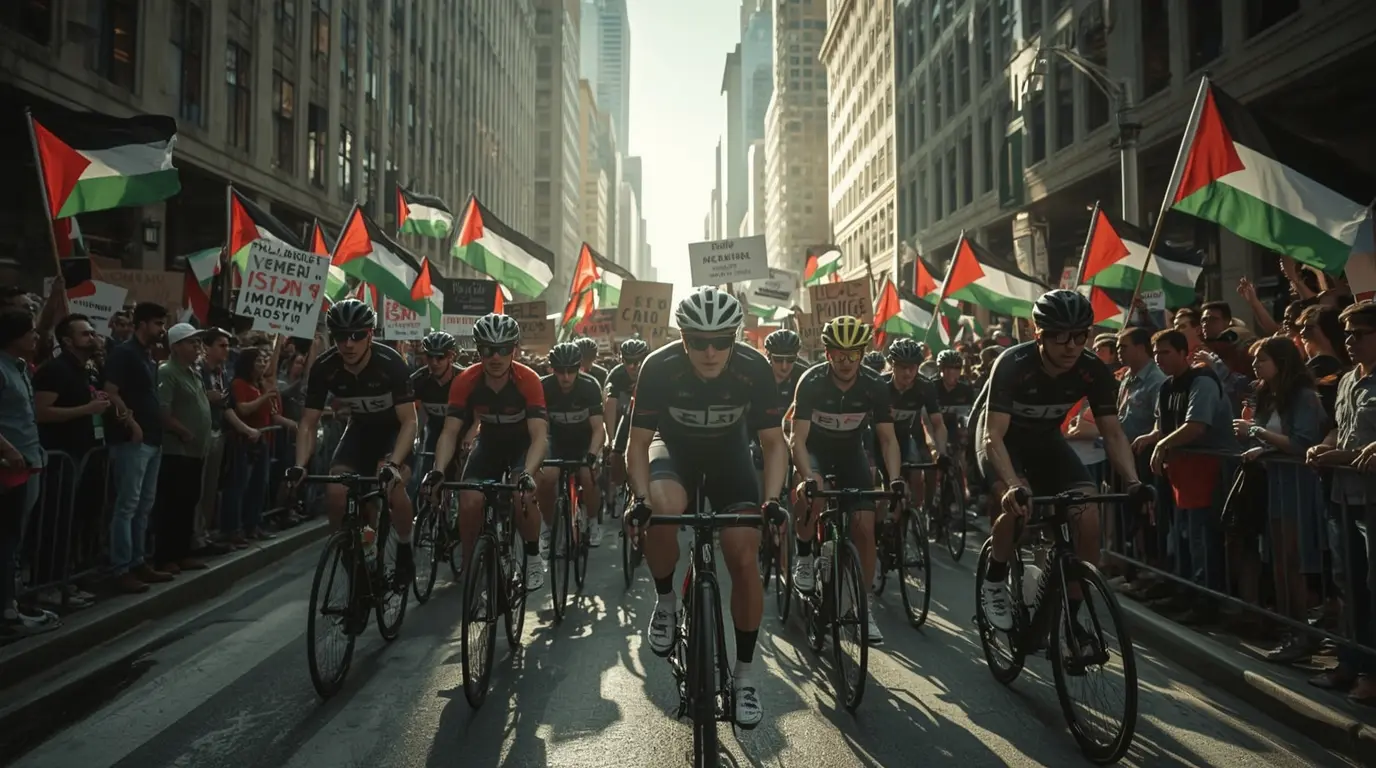Introduction
The 2025 Vuelta a España wrapped up in an unforgettable way on September 14th when huge protests led officials to call off the Madrid finale. Danish star Jonas Vingegaard (Visma–Lease a Bike) was crowned overall champion of the three-week tour, even though the usual victory parade and podium ceremonies were scrapped for safety reasons. The stunning finish shows how international conflicts are now shadowing pro cycling, turning a victory lap into a stage for geopolitical messages rather than just the celebration of athletic skill.
The Dramatic Disruption of Cycling’s Grand Finale
Final days at the Vuelta are usually celebratory. The overall leader rides victory laps on a loop through Madrid’s historic streets, and the riders are cheered at a sparkling podium in front of the Royal Palace. This year, the scene changed in seconds when crowds of pro-Palestinian activists broke through barricades and took over the route along the Paseo del Prado, one of the capital’s most famous boulevards. The race’s last kilometers became an unexpected protest site instead of the celebratory track the riders were ready for.
Spanish officials believe more than 100,000 demonstrators flooded the streets and roadways, forcing the championship-ending stage of the Vuelta a España to grind to a complete halt. Anger was squarely aimed at the Israel-Premier Tech squad, a team linked to Israeli-Canadian investor Sylvan Adams, whom the World Jewish Congress calls a “promoter of Israel’s global image.” Initially, the protests remained calm, but tension soared when some participants knocked down barriers and stormed the course, prompting scuffles with officers who fired tear gas to create a safe route for emergency response.

Race organizers already were coping with the worries of having more than 1,500 para-uniformed officers booked onto the stage when the director’s team declared that the degree of danger had passed the “acceptable to riders” threshold. “Neutralization” was ordered roughly 50 kilometers before the planned finale on Madrid’s famed Paseo de la Castellana; no stage champion was named, the race time taken from the previous stage, and the expected winner’s podium walk was canceled for security reasons.
Key Facts About the 2025 Vuelta a España
| Detail | Information |
|---|---|
| Overall Winner | Jonas Vingegaard (Visma–Lease a Bike) |
| Winning Margin | 1 minute, 16 seconds |
| Final Stage | Abandoned due to protests |
| Protester Estimate | Over 100,000 participants |
| Police Deployment | 1,500+ officers |
| Injuries | 22 police officers |
A Broader Context of Protest
The abrupt end to the Vuelta’s concluding stage wasn’t just a surprise finish; it was the endpoint of a three-week-long wave of protests that overshot the year’s biggest Spanish bike race. Sources say that of the last 11 days, seven had either delays or route switches because large groups organized to spotlight the Israel-Premier Tech team.

Earlier in the race, familiar scenes had already unfolded:
- Stage 11 in Bilbao saw the race neutralized; last-chance riders couldn’t cross the kilometer banner after activists formed a human chain, so organizers left the day blank in the records.
- Stage 16, in the coastal region of Galicia, rerouted after clashes erupted between uniformed police and hundreds of unsanctioned protests.
- Throughout the program, riders publicly warned that some had serious thoughts of abandoning as arbiter blocks and ensuing tumbles emptied team buses.
What began as bike wheels and sweat slowly twisted into mass protests, with each arrival leaving organizers to re-plot the third Grand Tour on the calendar. Decisions balanced crowd-agreements with the real threat of disorder, leaving each day in the pack one leg short of a three-week odyssey.
The Political Dimension
The Vuelta protests unfolded at a time of high diplomatic friction between Spain and Israel. In 2024, Spain formally recognized a Palestinian state, recently recalled its ambassador from Tel Aviv and prevented two far-right Israeli ministers from boarding flights in its territory.
During a Socialist Party gala in Malaga, Prime Minister Pedro Sánchez expressed solidarity with the Palestinian cause, asserting that the nation stands proudly with protesters. “Today, Spain serves as an international benchmark in the fight for human rights and serves an example of solidarity for a Palestinian state,” Sánchez declared.
This pronouncement prompted quick and intense backlash from Tel Aviv. Israeli Foreign Minister Gideon Saar labelled Sánchez a “national disgrace,” alleging the Prime Minister incited the Madrid protests. Saar further asserted Sanchez had “deployed state resources to nurse the radical protesters” and had urged them to “fill the streets” with what he termed “lawless hatred.” Madrid’s mayor, José Luis Martínez-Almeida, labelled Sunday’s protest a moment of “sad significance” for the Spanish capital whose streets he felt had been “desecrated” on what he assured was a day of sports.
La Vuelta found itself in the eye of a political storm of sorts this year. Race director Javier Guillén said earlier this season, when there were demands to drop Israel-Premier Tech from the lineup, “We can’t expel it from La Vuelta. It’s impossible, and it’s in the race by its own right. It has every right to participate, and we have every right to host it.” Those words still echoed in the days leading up to the Grand Tour’s opening stage.
The Athletic POV
Amid the backdrop of international controversy, the 2025 Vuelta unfolded as a remarkable sporting tale. Danish star Jonas Vingegaard claimed the overall title, adding to the Tour de France trophies he secured in 2022 and 2023. Vingegaard built his lead during stage 2 and then widened it on stage 9, riding the rollercoaster of the second week with a stomach virus. He finally secured his red jersey on the race’s penultimate day, ascending the legendary Bola del Mundo in front of a gasping crowd and a breathtaking climb in the race’s history.
The wild ending to the Vuelta robbed Jonas Vingegaard and his squad of the big coronation they had earned. “It’s a shame such a perfect moment was taken away from us,” Vingegaard said. “I am really let down. I was excited to share this victory with my teammates and with the fans. I understand people have the right to protest, but when it affects the race and puts us in danger, it’s not right.”

When the dust settled on the final standings, the overall podium was set. João Almeida from UAE Team Emirates XRG took second, crossing the line over a minute down on Vingegaard, while Tom Pidcock of Q36.5 Pro Cycling Team bagged the third step. Other highlights from the tour included Mads Pedersen dominating the points competition, Jay Vine topping the climbs, and Matthew Riccitello of Israel-Premier Tech grabbing the white jersey as the best young rider.
2025 Vuelta a España Final Podium
| Position | Rider | Team | Time |
|---|---|---|---|
| 1 | Jonas Vingegaard | Visma–Lease a Bike | 74h 20′ 28″ |
| 2 | João Almeida | UAE Team Emirates XRG | +1′ 16″ |
| 3 | Tom Pidcock | Q36.5 Pro Cycling Team | +2′ 43″ |
Organizational Response and Safety Measures
The Vuelta a España organizers tackled a challenging situation this year. Protests across the route raised questions about athlete safety and forced the event to carry on anyway. After stage 13, riders from Israel-Premier Tech rode stage fourteen and beyond without branding on their jerseys. The race later clarified, though, that the official title is still Israel–Premier Tech.
The final Madrid stage saw extra security: 1,500 police officers joined the 130 already with the race. The presence included personnel in riot gear, patrols on horseback, and military-style trucks parked to monitor the scene. Along the route, several checkpoints checked bags and followed riders closely to avoid larger interruptions.
Even with these preparations, the protest crowds outnumbered the officers and disrupted the stage. The race organizers put out a statement saying that the “lamentable incidents in Madrid” forced them to cancel the planned finish. Later in the evening, the teams held a private podium ceremony. The riders received their trophies and jerseys away from the cameras and fans, able to finish the race in a quieter atmosphere.
Historical Significance and Future Implications
The disrupted edition of the Vuelta stands as one of the most remarkable interruptions of a major sports calendar due to political protests in recent years. Cancelation of the last stage acts as a watershed moment: such an event has occurred elsewhere, yet a stage AWS-level cycling has never faced an equivalent episode.
Looking ahead to the 2025 Vuelta, expectation already builds for exhaustive consultations among global sports bodies over next episodes in which international tension overlaps with event hosting. The discussion has already matured. The Spanish Minister of Sports, Pilar Alegría, recently insisted that allowing Israeli squads to race resembles the rationale for sanctioning Russian talents after the Ukraine conflict, and that, unless logically equal, it creates a “double standard.”
The consequences reach all international multipliers and invite thoughts of future Olympic and world championship formats. The Vuelta has already encouraged organizers to broaden safety manuals, exploring an expansion of the zone, mediation staff and earlier team briefings. Any new race committee environment decision, such as excluding squads tied to a specific regime, will trigger prolonged anti-discrimination examination and potential lawsuits that might accompany forecasts.
Looking Forward
While cycling fans still digest the dramatic closing of the 2025 Vuelta, the sport is already shifting its gaze to upcoming races and the lessons this edition has taught us. Vuelta leadership is under pressure to refine its security playbook to ensure that the shadows of political interference do not threaten the stunning tapestries of any future edition.
For the peloton, the emphasis shifts from navigating turbulence to chasing performance. Jonas Vingegaard’s ability to ride to the red-carpet finale under testing conditions adds a brilliant highlight to what is already a heroic Grand Tour dossier. Remaining locked-in despite rolling disruptions for more than three weeks is proof that to be a champion is as much about mental conditioning as it is about raw watts.
History will etch the 2025 Vuelta a España as the much-publicized grand loop that was as geopolitical as it was athletic. As the sport’s diamonds—Grand Tours—expand to new continents and new countries, the organizing brain trusts—race directors, national federations, and sponsors—must master a diplomatic overhead that protects the racing heart and the fans’ high spirits.
Source: https://edition.cnn.com/2025/09/14/europe/spain-cycling-protest-vuelta-gaza-israel-latam-intl
For more incredible stories of everyday news, return to our homepage.





